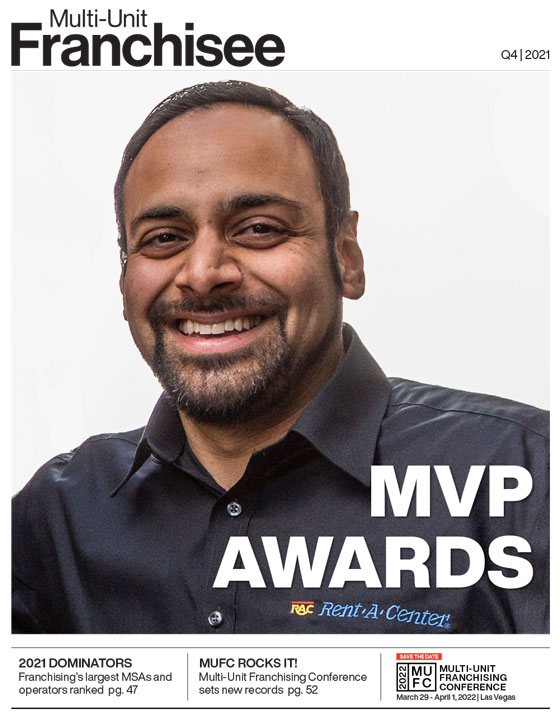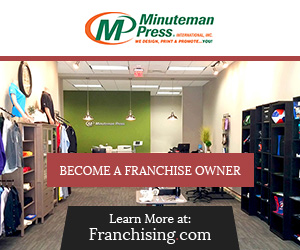Tomorrow's Legacy Today: The importance of succession planning

If the pandemic has forced home anything, it’s that life is unpredictable. Ensuring the growth and multi-generational longevity of a franchise business means planning today to protect the legacy of tomorrow.
“It’s been a disruption for everyone on every front. If we use this time wisely and continue to evaluate the environment, it should cause us to be more intentional about business planning,” says Paul M. Booth Jr., president of Cincinnati-based Concentric Brands. “If you can position yourself in your organization to not just work in the business but work on the business, especially the owner-operators, that will actually help you with activities like succession planning, forecasting for growth, and understanding when to exit as well.”
The world is changing, and so is the formula for lasting family business success, notes PwC’s 10th Global Family Business Survey. The survey of 2,801 family businesses across 87 territories reveals the resilience, financial strength, and optimism of family-business owners—along with challenges such as the need for companies today to make ESG (environmental, social, and governance) and strong digital capabilities a priority.
Family values matter, but the analysis found that only 44% of those queried had anything formal written down in terms of a succession plan. The estimated 41% of family businesses that do were shown to have a robust, documented, well-communicated succession plan in place.
Family values
The value of solid succession planning while growing a robust, sustainable business is not news to Kendall Rawls, director of development for The Rawls Group. Still, she says, too many franchisees are not getting the message.
The multi-unit franchise model is a relatively new niche, with fewer second- and third-generational companies than, say, manufacturing, says Rawls, a second-generation family member of the business succession planning firm, which has offices in Atlanta, Los Angeles, Orlando, and Des Moines.
“Many franchisees don’t consider themselves family-owned because ‘family’ isn’t in the business yet,” she says. “In our experience, where two or more people work together for reasons other than money, it is a family business. Family-like bonds are created and, assuming the company is successful, family members may become interested down the road. Not addressed ahead of time this can create many complications.”
To create a foundation for ongoing success, Rawls encourages multi-unit franchisees to expand their definition of succession planning beyond an exit strategy, estate planning, and retirement.
“If a franchisee’s goal is to buy a job and see where the chips fall, there is no need for succession planning,” she says. “However, if the goal is to build wealth, affect lives, and create opportunities for the future, the purpose of succession planning is to build an unbreakable chain of strategies to overcome the possible, probable, and potential issue affecting the achievement of your vision. Essentially, it’s about creating and refining strategies for sequential successes, no matter what is thrown their way.”
Booth, a second-generation McDonald’s multi-unit franchisee, doesn’t know if his 5-year-old daughter, whom he affectionately calls his “co-CEO,” will wind up in the family business one day, but he is driven by a purpose to build a business legacy that provides her with the opportunity. He is taking what he learned over a decade in the McDonald’s system to pursue diversified opportunities for the next generation as a franchisee of Ace Hardware.
“When we think about succession and legacy, we can think really linearly about it,” says Booth. “Your legacy in the business is bigger than the brand you are in. People buy and sell brands all day long. Families and organizations have to think about succession and legacy bigger than just one brand and one line of business. I look at my leg of the race as extending the business and extending the foundation that was given to me.”
A solid plan, established early and revisited often, includes a vision and specifics on ownership, governance, and philanthropic goals—and whether family members are employed in the company or not. When roadblocks do arise, they generally surface in bench strength, successor development, family dynamics, and growth strategy, says Rawls.
Friction-free
The Kurth family, franchisees of six Weed Man locations, continues to serve as a testament to the friction-free rewards that come with proper succession planning, transparency, and ongoing communication.
Terry Kurth, a Madison, Wisconsin-based Weed Man franchisee since 2001, turned to outside professionals to create a clear succession path that addresses all the nuances that come with only one of his four children, Andy Kurth, active in the business.
Andy grew up working in the family business, joining full-time in 2004 after earning a degree in soil science and turf management from the University of Wisconsin-Madison. His leadership running the day-to-day operations as president and CEO allows his father to consider himself “90% retired” and focused mainly on consolidations.
Terry crafted a plan that provides Andy’s three siblings with non-voting shares and a steady income for his children and family. Two non-family branch managers, instrumental in scaling “mammoth growth” in Austin and Denver, are also minor shareholders in the $23 million company.
“My dad trusts my leadership and my siblings are passive owners,” says Andy. “They never give me grief for where we’ve taken the business. My dad has never micromanaged me. He provides feedback and insight where necessary. If I’m wrong, we’ll talk about it, and I’ll pivot. We have a lot of respect for one another and what we’ve built together.”
Building a deep bench ensures that the company can perform at the high level needed for a smooth succession, whether family or not. Both the chief operating officer and director of operations can function in his role and run the business without him, says Andy.
Today he focuses on acquiring high-level thinking talent with quick reaction times who are energized to lead the business. For instance, he credits the “mind and heart” of his brother-in-law, who joined the company as director of marketing in 2020, as being integral to the success of the family business.
“Our people are our succession,” says Andy. “We make it a point always to promote and have the career opportunity in front of people. We feel that’s the best way to keep them energized, as they are motivated by the opportunities. As long as our people have the energy, we are willing to go there with them.”
Get your ducks in a row
Nick Marco, a Hand & Stone Massage and Facial Spa multi-unit franchisee, understands the value of thoughtful planning for continuity in more ways than one. The son of the brand’s founder, Marco came up with the Hand & Stone name his father, John Marco, settled on when the brand’s first location opened in Toms River, New Jersey, in 2004. After building a trailblazing national brand, John Marco retired when Hand & Stone was acquired by Los Angeles-based private equity firm Levine Leichtman Capital Partners in 2015.
The younger Marco, a registered nurse with a degree in biochemistry and molecular biology from Penn State, returned to Hand & Stone in 2014, following his passion for health to excel as a franchisee of nine New Jersey spas, co-owned with his sister.
“If you were to be approached tomorrow by someone wanting to buy your business, you shouldn’t have to do a lot of due diligence to get it to be ready to be presented,” he says. “This is something that I have absolutely taken away from my father’s experience. Having really intelligent people to seize opportunities, and getting that financial discipline early on, enables you to exceed industry standards and will elevate your business.”
He also benefits from knowing what it takes to succeed as a regional developer of 14 Hand & Stone locations in Ohio. Family-owned companies are not always structured as formally as they should be, he says, leading to “too many cooks in the kitchen” because responsibilities are unclear. When working with franchisees eager to include family members, he makes sure it’s the right fit.
“I’m very direct, and so is my team,” says Marco. “We make it clear that you are paying us to support you, and I’m not going to set you up for failure. If you tell me you want to have a family member involved in the business, I’m going to ask you to be completely honest about their skill set. If it’s not strong and you are brand new, I’ll say, ‘Don’t do it.’”
The franchisor factor
Succession planning for continuity must meet the owner’s vision and goals, but it also must satisfy the franchisor’s requirements for the brand. This is just another reason to stay engaged with your franchisor, says Schlotzsky’s multi-unit franchisee JJ Ramsey, who serves as a member of Schlotzsky’s franchisee advisory committee.
“It is important to maintain an open dialogue with franchisors to ensure that your business is running efficiently and delivering a great customer experience, regardless of behind-the-scenes circumstances,” says Ramsey. “I am a true believer in maintaining a great relationship with the team at corporate and being an active participant with the brand.”
Growing up, Ramsey learned the value of family business decision-making by working with his siblings and parents in their Schlotzsky’s restaurants. After his father sold the family’s portfolio of 8 restaurants in 2011, Ramsey worked as a consultant for the brand, returning to the fold as a franchisee in 2015. He and his wife and business partner Hortencia Ramsey oversee a burgeoning portfolio of 20 Schlotzsky’s locations in Texas, Arkansas, Missouri, and Kansas.
Ramsey is in extreme growth mode right now and focused on building “the biggest business I can imagine,” he says. In 2020, he decided to remodel 10 of his Schlotzsky’s restaurants, and he recently opened the first location of the brand’s new prototype.
While his oldest son already works in one of the family’s restaurants, Ramsey says that when it comes time to focus on the next step in succession planning, their three children, now 17, 7, and 7, will not be obligated to join the family business. Instead, he will encourage them to do what makes them happy.
“Try different things,” he says. “It’s important to encourage your family, especially kids, to do their own thing so they do what they find most rewarding.”
Building a Formula for Enduring Success
Let’s face it. Family businesses—based and built on familial or personal relationships—are complex, noted PwC’s 10th Global Family Business Survey, which includes survey and panel discussion insights from executives and leaders representing a mix of business and industries.
“Family harmony should never be taken for granted, writes Peter Englisch, Global Family Business Leader at PwC. Instead, he says, “It’s something that must be worked on and planned for with the same focus and professionalism that’s applied to business strategy and operational decisions.”
It’s imperative for family business leaders to act now to “embrace a new formula for enduring family business success,” the report noted. This suggests the need for ongoing communication to structure plans that include digitization, diversification, upskilling, ESG initiatives, family continuity plans, and the following peer recommendations:
- Professionalize family governance. A professional approach strips emotion and personal bias from decision-making. Any governance structure should include a straightforward process for conflict resolution, preferably involving an independent party.
- Establish governance that reflects that families are dynamic. Revisit governance structures regularly to review ownership structures that can change through marriages and over time as the next generation of leadership enters the business.
- Write values down. A written account of family business values can serve as the common ground to bridge generational gaps and establish transparent communication and transitions.
- Allow external help. Conflict and differences of opinion are inevitable and the emotions involved in family discussions can be difficult to resolve internally. A neutral, outside perspective can help.
Don’t Go It Alone!
Seeking professional support can help business owners navigate the emotional aspects of succession, identify the blind spots within their corporate structure, and provide options that enable owners to focus on growth opportunities.
“I would encourage all families to get some help with succession planning,” says Booth. He credits time well spent a few years ago at the University of Cincinnati’s Goering Center for Family and Private Business for providing his family with a framework to look beyond the day-to-day grind. Vision alignment and setting up a time frame for transition are critical components to keeping the business humming, he says.
Booth says it’s vital to recognize and appreciate that leadership styles within the family may differ by generation. “The next generation must be able to lead the organization to a better result by being comfortable in their own skin and setting a healthy culture in the organization to keep it going forward,” he says. By embracing new ideas, leveraging technology, and being open to new possibilities, family-owned franchises can build on their strengths and overcome the inevitable obstacles and challenges that come with growing and leading a family business.
Share this Feature
Recommended Reading:
Comments:
comments powered by DisqusFRANCHISE TOPICS
- Multi-Unit Franchising
- Get Started in Franchising
- Growth
- Operations
- Open New Units
- Leadership
- Marketing
- Technology
- Legal
- Awards
- Rankings
- Trends
- Featured Franchise Stories
FEATURED IN

Multi-Unit Franchisee Magazine: Issue 4, 2021
$500,000




 The multi-unit franchise opportunities listed above are not related to or endorsed by Multi-Unit Franchisee or Franchise Update Media Group. We are not engaged in, supporting, or endorsing any specific franchise, business opportunity, company or individual. No statement in this site is to be construed as a recommendation. We encourage prospective franchise buyers to perform extensive due diligence when considering a franchise opportunity.
The multi-unit franchise opportunities listed above are not related to or endorsed by Multi-Unit Franchisee or Franchise Update Media Group. We are not engaged in, supporting, or endorsing any specific franchise, business opportunity, company or individual. No statement in this site is to be construed as a recommendation. We encourage prospective franchise buyers to perform extensive due diligence when considering a franchise opportunity.